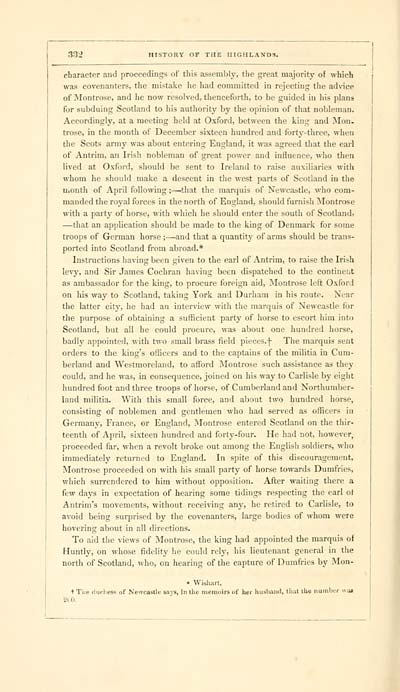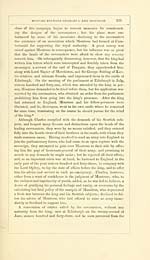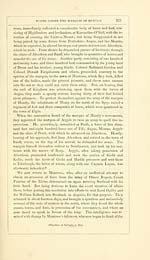Download files
Complete book:
Individual page:
Thumbnail gallery: Grid view | List view

332 HISTORY OF THE HIGHLANDS.
character and proceedings of this assemblj', the great majority of which
was covenanters, the mistalie he had committed in rejecting tlie advice
of Montrose, and lie now resolved, thenceforth, to be guided in liis plans
for subduing Scotland to his authority by the opinion of that nobleman.
Accordingly, at a meeting held at Oxford, between the king and Mon.
trose, in the month of December sixteen hundred and forty-three, when
the Scots army was about entering England, it was agreed that the earl
of Antrim, an Irish nobleman of great power and influence, who then
lived at Oxford, should be sent to Ireland to raise auxiliaries with
whom he should make a descent in the west parts of Scotland in the
month of April following ; — that the marquis of Newcastle, who com-
manded the roj-al forces in the north of England, should furnish Montrose
with a pai ty of horse, with which he should enter the south of Scotland,
— that an application should be made to the king of Denmark for some
troops of German horse ; — and that a quantity of arms should be trans-
ported into Scotland from abroad.*
Instructions having been given to the earl of Antrim, to raise the Irish
levy, and Sir James Cochran having been dispatched to the continent
as ambassador for the king, to procure foreign aid, Montrose left Oxford
on his way to Scotland, taking York and Durham in his route. Near
the latter city, he had an interview with the marquis of Newcastle for
the purpose of obtaining a sufficient party of horse to escort him into
Scotland, but all he could procure, was about one hundred horse,
badly appointed, with two small brass field pieccs.f The marquis sent
orders to the king's officers and to the captains of the militia in Cum-
berland and Westmoreland, to afford Montrose such assistance as they
could, and he was, in consequence, joined on his way to Carlisle by eight
hundred foot and three troops of horse, of Cumberland and Northumber-
land militia. With this small force, and about two hundred horse,
consisting of noblemen and gentlemen who had served as officers in
Germany, France, or England, Montrose entered Scotland on the thir-
teenth of April, sixteen hundred and forty-four. He had not, however,
proceeded far, when a revolt broke out among the English soldiers, who
immediately returned to England. In spite of this discouragement,
Montrose proceeded on with his small party of horse towards Dumfries,
which surrendered to him without opposition. After waiting there a
few days in expectation of hearing some tidings respecting tlie earl of
Antrim's movements, without receiving any, he retired to Carlisle, to
avoid being surprised by the covenanters, large bodies of whom were
hovering about in all directions.
To aid tlie views of Montrose, the king had appointed the marquis of
Huntly, on whose fidelity he could rely, his lieutenant general in the
north of Scotland, who, on hearing of the capture of Dumfries by Mon-
tTliedi
a .(I.
• Wisliarl,
clies^ of Ne\Tcastle says, In the memoirs of her Imsband, that thy i
character and proceedings of this assemblj', the great majority of which
was covenanters, the mistalie he had committed in rejecting tlie advice
of Montrose, and lie now resolved, thenceforth, to be guided in liis plans
for subduing Scotland to his authority by the opinion of that nobleman.
Accordingly, at a meeting held at Oxford, between the king and Mon.
trose, in the month of December sixteen hundred and forty-three, when
the Scots army was about entering England, it was agreed that the earl
of Antrim, an Irish nobleman of great power and influence, who then
lived at Oxford, should be sent to Ireland to raise auxiliaries with
whom he should make a descent in the west parts of Scotland in the
month of April following ; — that the marquis of Newcastle, who com-
manded the roj-al forces in the north of England, should furnish Montrose
with a pai ty of horse, with which he should enter the south of Scotland,
— that an application should be made to the king of Denmark for some
troops of German horse ; — and that a quantity of arms should be trans-
ported into Scotland from abroad.*
Instructions having been given to the earl of Antrim, to raise the Irish
levy, and Sir James Cochran having been dispatched to the continent
as ambassador for the king, to procure foreign aid, Montrose left Oxford
on his way to Scotland, taking York and Durham in his route. Near
the latter city, he had an interview with the marquis of Newcastle for
the purpose of obtaining a sufficient party of horse to escort him into
Scotland, but all he could procure, was about one hundred horse,
badly appointed, with two small brass field pieccs.f The marquis sent
orders to the king's officers and to the captains of the militia in Cum-
berland and Westmoreland, to afford Montrose such assistance as they
could, and he was, in consequence, joined on his way to Carlisle by eight
hundred foot and three troops of horse, of Cumberland and Northumber-
land militia. With this small force, and about two hundred horse,
consisting of noblemen and gentlemen who had served as officers in
Germany, France, or England, Montrose entered Scotland on the thir-
teenth of April, sixteen hundred and forty-four. He had not, however,
proceeded far, when a revolt broke out among the English soldiers, who
immediately returned to England. In spite of this discouragement,
Montrose proceeded on with his small party of horse towards Dumfries,
which surrendered to him without opposition. After waiting there a
few days in expectation of hearing some tidings respecting tlie earl of
Antrim's movements, without receiving any, he retired to Carlisle, to
avoid being surprised by the covenanters, large bodies of whom were
hovering about in all directions.
To aid tlie views of Montrose, the king had appointed the marquis of
Huntly, on whose fidelity he could rely, his lieutenant general in the
north of Scotland, who, on hearing of the capture of Dumfries by Mon-
tTliedi
a .(I.
• Wisliarl,
clies^ of Ne\Tcastle says, In the memoirs of her Imsband, that thy i
Set display mode to: Large image | Transcription
Images and transcriptions on this page, including medium image downloads, may be used under the Creative Commons Attribution 4.0 International Licence unless otherwise stated. ![]()
| Early Gaelic Book Collections > Ossian Collection > History of the Highlands and of the Highland clans > Volume 1 > (446) |
|---|
| Permanent URL | https://digital.nls.uk/79677949 |
|---|
| Description | Vol. I. |
|---|---|
| Shelfmark | Oss.247 |
| Additional NLS resources: | |
| Attribution and copyright: |
|
| Description | Selected books from the Ossian Collection of 327 volumes, originally assembled by J. Norman Methven of Perth. Different editions and translations of James MacPherson's epic poem 'Ossian', some with a map of the 'Kingdom of Connor'. Also secondary material relating to Ossianic poetry and the Ossian controversy. |
|---|
| Description | Selected items from five 'Special and Named Printed Collections'. Includes books in Gaelic and other Celtic languages, works about the Gaels, their languages, literature, culture and history. |
|---|

